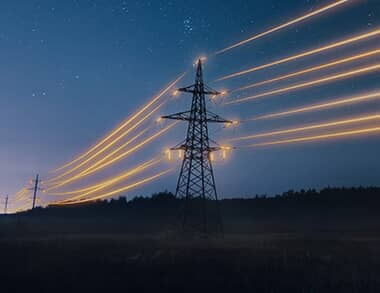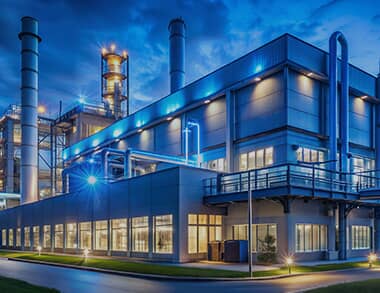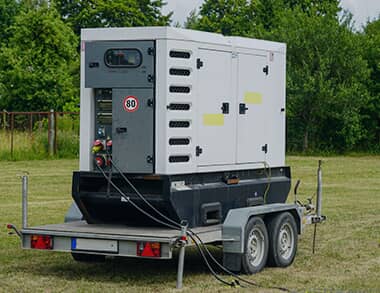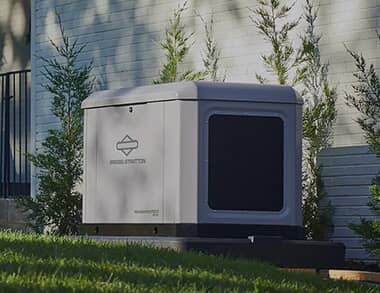NFPA Safety Standards Help Prevent Dangerous Fires

NFPA 110 and NFPA 37 are the bedrock of the power generation industry. The standards set forth within these codes governing the safe operation of emergency and standby power generation systems are designed to protect lives and structures from generator fires, carbon monoxide poisoning, etc. Adherence to these generator safety standards is not something our EGSA certified generator technicians consider optional. To that end, we work closely with our clients to ensure that their generators and facilities meet and exceed the minimum safety requirements.
NFPA 110 7.2.1.1 states that rooms housing an emergency power generator must be separated from the building within a structure that has a minimum 2-hour fire-resistance rating. This means that the walls must be of sufficient thickness and coated with an appropriate insulating material that can withstand the heat from an internal fire without suffering structural collapse.
Ventilation is another vital element of fire prevention when operating generator systems. Improper ventilation can increase the risk of hot surface ignition as diesel fuel vapors circulate through the room and make contact with the generator's engine. NFPA 37 requires that the generator be sufficiently ventilated to prevent the buildup of combustible fumes and to prevent overheating that can compromise wire integrity. As per NFPA 110 7.7.7, ventilation systems must take into account heat, cold, dust, humidity, snow/ice accumulation, louvers, remote radiator fans, and prevailing winds that may blow against the radiator fan and discharge air.
Fire detection and suppression systems are investments that are worth every penny. Clean agent, direct release, indirect release, or hybrid release systems can often stop fires before they spread. They are most effective when coupled with spark detection systems and remote monitoring systems. While these systems may not save the generator from loss, they can prevent significant damage to the structure and make it possible for employees to safely evacuate the area without injury.
A significant number of generator fires are caused not by human error, but by neglected maintenance. Hiring a certified professional to perform maintenance on power generation equipment ensures that all components will be properly inspected, and that all repairs will be performed correctly.
NFPA 110 8.1.1 states that routine maintenance and operation testing must adhere to the manufacturer's recommendations, instruction manuals, and any requirements established by the jurisdictional authority. It's vital that operators adhere to all manufacturer maintenance guidelines, and that all service on the generator be performed by an EGSA certified contractor.
In fact, NFPA 110 8.5.1 stipulates that power generator operators must create and maintain records of all inspections, tests, exercises, repairs, and modifications to all emergency power generation equipment. If there is a fire, these records are among the first things a fire inspector will ask to inspect.
Contact Gen-Tech Power Generation Specialists at (800) 625-8324 to discuss generator fire safety. We'll answer your questions and tell you more about the on-site safety inspection services we offer.
Critical Standards and Concerns for All Generator Operators
NFPA 110 7.2.1.1 states that rooms housing an emergency power generator must be separated from the building within a structure that has a minimum 2-hour fire-resistance rating. This means that the walls must be of sufficient thickness and coated with an appropriate insulating material that can withstand the heat from an internal fire without suffering structural collapse.
Ventilation is another vital element of fire prevention when operating generator systems. Improper ventilation can increase the risk of hot surface ignition as diesel fuel vapors circulate through the room and make contact with the generator's engine. NFPA 37 requires that the generator be sufficiently ventilated to prevent the buildup of combustible fumes and to prevent overheating that can compromise wire integrity. As per NFPA 110 7.7.7, ventilation systems must take into account heat, cold, dust, humidity, snow/ice accumulation, louvers, remote radiator fans, and prevailing winds that may blow against the radiator fan and discharge air.
Fire Suppression Systems Save Lives, Equipment, and Facilities
Fire detection and suppression systems are investments that are worth every penny. Clean agent, direct release, indirect release, or hybrid release systems can often stop fires before they spread. They are most effective when coupled with spark detection systems and remote monitoring systems. While these systems may not save the generator from loss, they can prevent significant damage to the structure and make it possible for employees to safely evacuate the area without injury.
Inspections & Maintenance
A significant number of generator fires are caused not by human error, but by neglected maintenance. Hiring a certified professional to perform maintenance on power generation equipment ensures that all components will be properly inspected, and that all repairs will be performed correctly.
NFPA 110 8.1.1 states that routine maintenance and operation testing must adhere to the manufacturer's recommendations, instruction manuals, and any requirements established by the jurisdictional authority. It's vital that operators adhere to all manufacturer maintenance guidelines, and that all service on the generator be performed by an EGSA certified contractor.
In fact, NFPA 110 8.5.1 stipulates that power generator operators must create and maintain records of all inspections, tests, exercises, repairs, and modifications to all emergency power generation equipment. If there is a fire, these records are among the first things a fire inspector will ask to inspect.
Contact Gen-Tech Power Generation Specialists at (800) 625-8324 to discuss generator fire safety. We'll answer your questions and tell you more about the on-site safety inspection services we offer.
Topics:
From Insights to Power: Let’s Talk Solutions
Whether you need emergency power, maintenance, or expert guidance on your generator system, Gen-Tech has you covered. Our experienced team provides industry-leading service to keep your power running when it matters most. Call (800) 625-8324 to discuss your power generation needs today!
Contact Us













